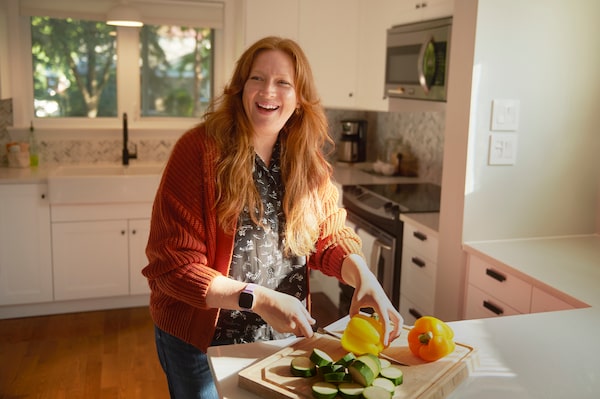
Brittany Gordon, a registered holistic nutritionist and owner of Healing Ginger in Ottawa.KAMARA MOROZUK/THE GLOBE AND MAIL
Brittany Gordon, a registered holistic nutritionist and owner of Healing Ginger in Ottawa, says there is something different about the people she interacts with these days: they’re being exceptionally hard on themselves about the way they look or the food they eat.
Whether it’s due to weight gain, the development of unhealthy habits or a desire to move one’s body more, “I think people are being very unfair to themselves right now,” says Ms. Gordon.
After long stretches of lockdowns, people are starting to head back to the gym, change their eating habits or just looking to get back into a healthier routine. But as Canadians slowly emerge into the gaze of others, experts worry that the negative messaging many tell themselves could be harmful to their success, and they believe revising those self-images is the first step many need to take to get back to healthy living.
“If your eating has drastically changed or you’re comforting yourself with homemade mac and cheeses and all your decadent stuff because it’s soothing and comforting, sure you might gain weight, but it’s not a reflection on your health,” says Ms. Gordon. “When it comes to food there is no good or bad, just more nourishing or less nourishing. There is no moral standing. So we need to let go of the guilt, the stress and the shame.”

Ms. Gordon suggests starting with small changes to build confidence and taking it day-by-day.Kamara Morozuk/the globe and mail
Avoiding added stress is key to better health, according to Ms. Gordon, including stressors such as taking on a meal plan or workout routine that is too intense or difficult to maintain. Instead, she suggests starting with small changes to build confidence and taking it day-by-day.
“If you want to drink more water then start [by tracking] how much water you actually drink, maybe it’s five glasses, then up it to 5.5 until that’s your routine, then move to six,” she advises. “Or if you’re getting one serving of vegetables a day, then maybe try getting two servings per day.”
Weight gain was a side-effect for many Canadians during the pandemic as their stress levels rose, they worked from home (closer to the fridge), and there were more pressing things in their lives than watching their waistline.
A recent report by the Agri-Food Analytics Lab at Dalhousie University, in partnership with Caddle, revealed that “42.3 per cent of Canadians have gained extra weight unintentionally during [the] pandemic.”
Stress or comfort eating was definitely at the heart of much of these waistline changes, explains Janet Music, research program co-ordinator of the Agri-Food Analytics Lab at Dalhousie University.
“There’s no one monolithic reason for why people gained weight except that a lot of people turned to food for comfort,” she says. “Whatever was driving that anxiety, too much work, not enough work … universally people turn to food to make themselves feel better and it was one of the only things available to people [during lockdown].”
But she says she, too, believes people need to start giving themselves a break for their food choices in these stressful times.
“You need to take care of your own mental health and if that means having a bag of chips or a muffin or an extra serving of mashed potatoes then people should go for it and get rid of the guilt and not worry about the opinions of anyone else, except a personal doctor,” she says.
“It makes me cringe, when I hear colleagues say things like ‘ugh, I gained 10 pounds and my pants don’t fit’ and the implication is that their bodies are wrong. But in reality, the pants are wrong, our bodies are not wrong,” she adds.
Getting back into exercise should also be done with mindfulness and compassion, explains Michelle Kuhnreich, creator of Booty By Mich and a personal trainer.
“Everyone is going through their own stuff, and we are our biggest critic,” she says. “If we are kind to ourselves with the judgments that we have, and – never mind the five pounds we put on – if we’re confident and happy with ourselves, you’ll easily shed that weight because you’ll want to be kinder to yourself when it comes to movement, kinder to yourself when it comes to eating.”
Ms. Kuhnreich’s biggest message for her clients is to take it day-by-day and to also turn inward, which for her means writing down her thoughts, feelings, goals and expectations in a journal. The pandemic, she explains, has created the opportunity for people to feel lonely at first and now there are many who have found happiness and motivation within themselves and that’s what’s going to fuel sustainable workout plans.
“That’s what I have found for myself throughout this pandemic,” says Ms. Kuhnreich, “and so I’ve realized that no one else can make me happy but me, no one else can motivate me but me, so I sit, I journal, I ask myself questions, I get to know myself more. Then I go into my workout and think about what’s bothering me and how I’m going to use my breath and my movement to help me alleviate that stress.”
The common message from experts is that this is a time to be kind to oneself. Canadians are trying to find a routine and normalcy after a long duration of chaos. And things aren’t quite normal yet, so do what you can to introduce a few healthier choices into your life but start small and gradual so it can be something that is enjoyable, not another thing to worry about.
“Life is already hard,” says Ms. Kuhnreich. “The last thing you want to do is add another thing that is stressful, or you don’t want to do.”